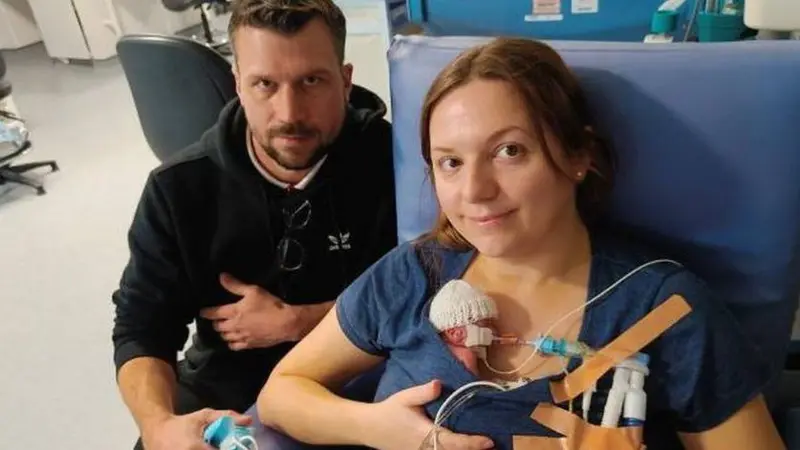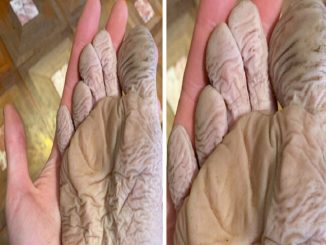
The parents of a baby named Robyn, who was born very tiny at just 11 ounces (328 grams), have finally brought her home after 18 months in the hospital.
Robyn was born five months early in March 2023 at Grange Hospital in Cwmbran, Torfaen, and she still needs special care all the time. Her parents, Chantelle (34) and Daniel (38) from Malpas, Newport, are raising money for her treatment. Chantelle said, “It’s like a dream come true to have Robyn home.”
Robyn was born at just 23 weeks and 2 days and was so tiny that she could fit in the palm of a hand. To keep her organs warm while she grew, she was kept in a sandwich bag.
After six months in the hospital, she spent another seven months in the pediatric intensive care unit at Noah’s Ark Children’s Hospital in Cardiff. She then returned to Grange Hospital until she was finally discharged in September.
Chantelle, who works part-time as an accountant, said, “It’s just so nice to do normal family things… and just all be together under one roof.”
Daniel, a self-employed bricklayer, mentioned that it’s much less chaotic at home now. He has had to cut back on work to focus on taking care of his daughter.

Robyn gets oxygen and nutrition through tubes in her nose and mouth, and her vital signs are watched all the time. She takes 30 doses of medication each day.
Her mom, Chantelle, explained, “She can’t cough, so we have to suction her mouth and nose throughout the day when she needs it.”
Daniel described Robyn as doing well and enjoying the “peace” of being at home. He added that they do a lot of physical therapy and play with her to help her senses.

Chantelle said it was tough to bond with Robyn in the busy hospital ward, with doctors and nurses always coming in and out.
“All you can do is sit next to her and watch,” she explained, “keeping an eye on the numbers on the screen and hoping she will be okay.”
“When Robyn was born, we weren’t sure if she would survive.
“As time went on, she grew bigger and stronger, but she still faced many problems. It became clear that her brain damage would have a big impact on her.”
‘We know nothing is impossible’
“We didn’t learn about her brain damage until about six months after she was born,” Daniel said.
“You have all these plans for how life will be, and then everything changes,” he added.
“But we try to stay positive.
“We know that nothing is impossible for Robyn because she has been told so many times that she wouldn’t be able to do things or even survive, but she keeps proving everyone wrong.
“She’s full of surprises, and I believe she will create her own story.”
How Smart Are You? Can You Find the Missing Number?

Puzzles and brain teasers have long been a delightful pastime, especially for those of us who love a good challenge. One of the classic puzzles involves spotting the one thing that’s out of place in a seemingly orderly setup. Here we have a grid of numbers ranging from 1 to 100, but there’s a catch. One number is mysteriously absent. Can your keen eyes detect which number is missing?
The Challenge Awaits
At first look, this number sequence seems perfectly normal, beginning at 1 and proceeding up to 100. Everything appears in order, but as you scan the list, you might notice something amiss — a number has vanished!
This task requires more than just a quick glance. It’s about meticulously examining each detail to uncover the missing piece. It’s a test of your attention span and how well you can notice slight discrepancies in everyday patterns.

How to Spot the Missing Number
To ease into the challenge, here’s a little technique: mentally follow the sequence column by column or row by row. Take your time, there’s no rush!
Have You Figured Out the Answer?
Warning: we’re about to reveal the solution. If you’re still pondering over it, take another look before reading any further.
So, did the missing number jump out at you? The elusive number is 66. Between 65 and 67, it simply slipped away, inviting you to notice the sudden gap!
What Your Findings Say About You
This brain teaser is more than a game; it’s a reflection of your problem-solving skills and how attentive you are to details. If you spotted the absence of 66 quickly, chances are you have a knack for recognizing patterns. This puzzle also highlights just how easily our brains can overlook tiny flaws, especially when they lie within an established sequence.
Through this simple exercise, we’re reminded that sometimes our minds can be deceptive, and it’s the smallest elements that make the largest impact. Were you able to spot the missing number immediately, or did it require some dedicated searching? We’d love to hear about your experience!



Leave a Reply